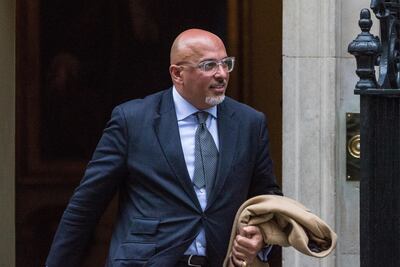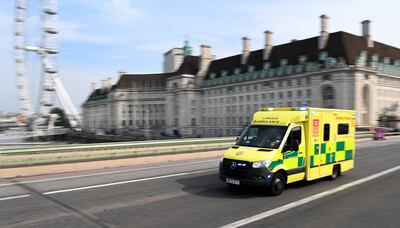The UK government will on Tuesday unveil a multibillion-pound plan to fix social care by raising taxes and breaking a manifesto pledge to pay for it.
Prime Minister Boris Johnson promised he would "not duck the tough decisions” to repair Britain's social care system that currently forces most people to pay for care, a set-up that people are sometimes forced sell their homes to pay for care.
But he is facing a major rebellion from MPs and senior party leaders over how to pay for the £34 billion ($47bn) bill.
A manifesto-busting increase on National Insurance payments and a UK tax on earnings and self-employed profit is the preferred option, but that means young people and lower income workers will bear the brunt of raising the money while the elderly are the main beneficiaries.
“We must act now to ensure the health and care system has the long-term funding it needs to continue fighting Covid and start tackling the backlogs, and end the injustice of catastrophic costs for social care," Mr Johnson said.

“My government will not duck the tough decisions needed to get NHS patients the treatment they need and to fix our broken social care system.”
Cabinet colleagues were promoting the new plan on Tuesday but there is widespread disquiet among MPs.
Vaccines Minister Nadhim Zahawi said he was “not comfortable with breaking any manifesto promises”.
“I think you have to at least have a really good go at making sure you fix a problem,” he said.
"The right thing to do is deliver the reform and the investment into social care – you’ve got to make sure that is operational."

Sir Andrew Dilnot, who led a landmark commission into the provision of social care in 2011, said the proposed reforms had the potential to be “transformational”.
“I think there’s a real chance we’ve finally got there. This is something that has been necessary, reform here has been necessary for at least 25 years and so if we have got there then that would certainly be a day to celebrate,” he said on Tuesday.
David Willetts, a former Conservative minister, said finding funding for social care was a longstanding problem that Mr Johnson could be rewarded for tackling successfully, but he needed to get more taxpayers paying the bill.
“If the government goes down this route they should be able to widen the taxes on income,” he said.
“What is not needed is young people paying all the taxes and older people are all the beneficiaries.”
He said raising taxes on dividends and capital gains could help the elderly beneficiaries of the plan play a part in funding the changes.
Jacob Rees-Mogg, the Leader of the House of Commons, former chancellor of the exchequer Philip Hammond, former prime minister John Major, the opposition Labour Party and trade unions have all criticised the plan.
Reports separately suggest that £5.5bn in additional funding has been agreed on for National Health Service shortfalls later this year, including to help clear the backlog caused by the coronavirus pandemic.
In England, thousands of pensioners end up selling their homes – often their most valuable asset – to meet the costs of care.
Only those with savings and assets worth less than £23,250 do not need to contribute.
Mr Johnson is expected to tell MPs on Tuesday that the challenges faced by the health service and the social care system are closely linked.
No 10 Downing Street said a lack of integration between the two often leads to people being “stuck in the wrong care setting, and families worry about meeting the costs of care if they leave NHS provision”.
It said the situation was “unfair and often catastrophic” with dementia patients having to pay for care, while someone cared for by the NHS would receive free care.
It said one in seven people now pays more than £100,000 for their care, and said the system can lead to “spiralling costs and the complete liquidation of someone’s assets”.
Reports suggest that lifetime contributions on care will be capped at about £80,000 and National Insurance will be increased by 1.25 per cent to raise £10bn-£11bn per year.
“I think that if the government were to go ahead with the proposed increase in National Insurance contributions, breaking a manifesto commitment in order to underwrite the care costs of older people with homes, I think that would provoke a very significant backlash,” Lord Hammond said.
“Economically, politically, expanding the state further in order to protect private assets by asking poor people to subsidise rich people has got to be the wrong thing to do.".
In the last election campaign Mr Johnson said: “We can do all these things without raising our income tax, VAT or National Insurance.”


